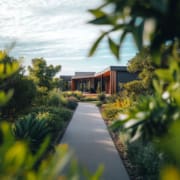Brisbane Landscaping Projects That Add Value to Your Property
Investing in landscaping projects can significantly enhance the appeal and value of your property. In Brisbane, where the subtropical climate offers unique opportunities for outdoor improvements, strategic landscaping can transform your garden into a standout feature of your home. Here’s how you can undertake landscaping projects that not only elevate your outdoor space but also increase the overall value of your property.
1. Create a Stunning Outdoor Living Area
An outdoor living area extends your home’s functional space and adds considerable value.
Decks and Patios
- Custom Decking: Install a custom timber or composite deck to create a versatile space for entertaining and relaxing.
- Paved Patios: Use high-quality pavers to construct a durable patio that serves as an inviting area for outdoor dining and gatherings.
Outdoor Kitchens and Dining
- Built-In BBQs: Incorporate a built-in BBQ or outdoor kitchen with all the essentials, such as countertops and storage, for an impressive culinary setup.
- Dining Spaces: Add a stylish dining area with weather-resistant furniture and lighting to enhance the usability of your outdoor space.
2. Enhance Curb Appeal with Front Yard Improvements
First impressions matter, and a well-designed front yard can significantly boost your property’s curb appeal.
Garden Beds and Plantings
- Low-Maintenance Gardens: Opt for low-maintenance plants and shrubs that provide year-round greenery without demanding excessive care.
- Seasonal Flowers: Incorporate seasonal flowering plants to add vibrant colour and visual interest throughout the year.
Pathways and Driveways
- Elegant Pathways: Construct pathways with attractive materials such as natural stone or decorative pavers to guide visitors and enhance the aesthetic appeal.
- Upgraded Driveways: Consider resurfacing your driveway with modern materials like exposed aggregate or stamped concrete to create a sleek and welcoming entrance.
3. Invest in Water Features for Luxury and Tranquility
Water features can add a touch of luxury and tranquility to your outdoor space, making it a desirable feature for potential buyers.
Fountains and Ponds
- Garden Fountains: Install a stylish garden fountain to create a focal point and add soothing sounds to your garden.
- Fish Ponds: Consider a well-maintained fish pond or water garden that adds beauty and serenity to your outdoor area.
Waterfalls and Streams
- Custom Waterfalls: Design a custom waterfall to create a natural-looking water feature that enhances the overall ambiance of your garden.
- Artificial Streams: Incorporate artificial streams or creeks to add a dynamic and visually appealing element to your landscape.
4. Build Functional and Aesthetic Retaining Walls
Retaining walls serve both practical and aesthetic purposes, providing structure while enhancing the visual appeal of your garden.
Stone Retaining Walls
- Natural Stone Walls: Construct natural stone retaining walls to add a classic and timeless look to your garden while managing soil erosion.
- Stacked Stone Walls: Use stacked stone for a more contemporary appearance that complements modern landscaping designs.
Timber and Modular Walls
- Timber Walls: Incorporate timber retaining walls for a rustic or natural look that blends well with lush garden settings.
- Modular Walls: Opt for modular block walls for a sleek and modern solution that provides flexibility in design and height.
5. Incorporate Sustainable and Eco-Friendly Features
Sustainable landscaping not only benefits the environment but also adds value to your property by appealing to eco-conscious buyers.
Water-Efficient Irrigation
- Drip Irrigation Systems: Install a drip irrigation system to ensure efficient water use and reduce water waste in your garden.
- Rainwater Harvesting: Implement a rainwater harvesting system to collect and reuse rainwater for irrigation, promoting sustainability.
Native and Drought-Tolerant Plants
- Native Plants: Choose native plants that are adapted to Brisbane’s climate and require less water and maintenance.
- Drought-Tolerant Varieties: Incorporate drought-tolerant plants to create a low-maintenance garden that thrives even during dry periods.
6. Add Privacy with Strategic Planting and Screening
Privacy is a valuable aspect of outdoor living, and effective screening can create a secluded and intimate garden space.
Hedging and Screening Plants
- Dense Hedging: Plant dense hedging varieties such as Lilly Pilly or Ficus to form a natural privacy barrier around your garden.
- Vertical Gardens: Use vertical gardens or green screens to create privacy on fences or walls while adding a lush and green aesthetic.
Pergolas and Privacy Screens
- Stylish Pergolas: Install a pergola with climbing plants or vines to provide shade and privacy while enhancing the garden’s visual appeal.
- Decorative Screens: Use decorative privacy screens made from materials like timber or metal to create private areas and add design elements.
7. Enhance Functionality with Smart Landscaping Features
Incorporating smart landscaping features can improve the functionality and efficiency of your outdoor space.
Outdoor Lighting
- LED Lighting: Install energy-efficient LED lighting to illuminate pathways, garden beds, and entertainment areas, enhancing safety and ambiance.
- Smart Lighting Systems: Use smart lighting systems that can be controlled via smartphone to adjust brightness and create different lighting moods.
Automated Irrigation Systems
- Smart Irrigation: Implement automated irrigation systems with smart controllers that adjust watering schedules based on weather conditions and soil moisture levels.
8. Upgrade Your Garden’s Flooring
High-quality flooring materials can enhance the usability and aesthetics of your outdoor space.
Outdoor Tiles and Pavers
- Durable Tiles: Choose outdoor tiles that are resistant to weather conditions and provide a stylish surface for patios and walkways.
- Decorative Pavers: Use decorative pavers to create visually appealing pathways, driveways, and garden areas.
Decking and Synthetic Turf
- Timber Decking: Install timber decking to create a warm and inviting outdoor area suitable for various activities.
- Synthetic Turf: Consider synthetic turf for a low-maintenance, evergreen lawn that provides a lush look without the upkeep of natural grass.
Investing in strategic landscaping projects can significantly enhance your property’s value and appeal in Brisbane. By focusing on elements like outdoor living areas, curb appeal, water features, retaining walls, and sustainable practices, you can create a garden that not only boosts your home’s market value but also provides lasting enjoyment. For expert guidance and top-quality landscaping services, contact Live Outdoors. Our team is dedicated to delivering exceptional results tailored to your needs and enhancing the beauty and value of your property.


